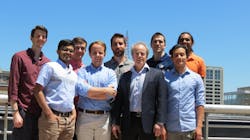Georgia Tech to lead new integrated photonics & electronics center
The Georgia Institute of Technology (Georgia Tech; Atlanta, GA) has been awarded funding to lead a new Industry-University Cooperative Research Centers Program (IUCRC) in integrated photonics, a key enabling technology in many commercial, defense, and scientific applications such as fiber communications, datacenters, RF analog links, quantum computing, and communications and sensing. Defense and aerospace applications of integrated photonics present many challenges for researchers—however, they provide enormous opportunities for advancements in the fields.
The Electronic-Photonic Integrated Circuits for Aerospace (EPICA) IUCRC was first proposed by faculty of the Georgia Electronic Design Center (GEDC), a center within the Institute for Electronics and Nanotechnology (IEN) at Georgia Tech. The GEDC is a cross-disciplinary research center focused on the development of high-speed electronic and photonics components and signal processing to achieve revolutionary system performance. It offers expertise in advanced photonics research, with more than 15 active faculty and over 100 graduate and undergraduate students.
EPICA’s foundation recognizes Georgia Tech as the leader in photonic integrated circuits for defense and aerospace applications. EPICA’s establishment will enable the next wave of communications and sensing technologies for LEO and space-borne platforms by designing monolithic solutions for advanced electronic-photonic integrated circuits and systems on the same die and geared specifically for aerospace applications via validation of the performance and reliability of these systems in harsh environments.
EPICA at Georgia Tech is led by Professor Stephen Ralph, Director of GEDC, and includes research teams from the University of Central Florida and Vanderbilt University.
